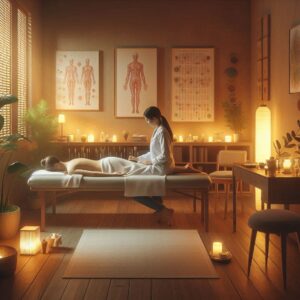Unlock the Healing Power of Acupuncture to Conquer Insomnia and Enhance Sleep Quality
Insomnia is a prevalent sleep disorder that can profoundly disrupt your daily activities by making it challenging to fall asleep, maintain sleep, or experience the deep, restorative rest that your body craves. This condition can manifest as a temporary hurdle lasting a few nights or develop into a chronic issue that lingers for months or even years. Various triggers can contribute to insomnia, including stress, worry, underlying depression, inconsistent sleep schedules, certain medications, high caffeine intake, and a myriad of medical conditions. By recognizing these potential triggers, you can create targeted strategies that not only restore healthy sleep patterns but also improve your overall health, resilience, and quality of life.
The struggle with inadequate sleep can lead to significant consequences for both physical and emotional health. Chronic sleep deprivation can weaken your immune system, heightening the risk of serious health problems such as cardiovascular diseases, increasing vulnerability to ailments like diabetes, contributing to obesity, and impairing cognitive functions. On an emotional level, the effects can surface as increased anxiety, depression, mood fluctuations, and irritability, severely affecting mental well-being. Additionally, deficits in attention, memory, and decision-making can complicate the challenges tied to long-standing insomnia. Thus, identifying and addressing the root causes of insomnia is essential for mitigating these adverse health effects and restoring a sense of well-being.
Essential Knowledge About Insomnia and Its Significant Effects on Overall Health
- Insomnia is a complex sleep disorder characterized by difficulties falling asleep, maintaining sleep, or waking too early, leading to reduced overall health and productivity.
- This disorder can stem from various factors such as stress, anxiety, depression, poor sleep hygiene, and certain medications, all of which can disrupt normal sleep patterns.
- Prolonged sleep deprivation can significantly compromise your health, resulting in a weakened immune system, higher risk of chronic conditions, decreased cognitive abilities, and emotional instability.
- Acupuncture enhances sleep quality by stimulating targeted acupoints, helping to balance the body's energy flow and inducing a state of deep relaxation.
- A wealth of studies supports the idea that acupuncture can notably improve sleep quality and address various symptoms associated with insomnia.
- This ancient practice effectively combats insomnia by reducing anxiety, encouraging relaxation, and restoring equilibrium to the body's energy systems.
- Research suggests that acupuncture may boost melatonin levels, help regulate circadian rhythms, and enhance overall sleep quality.
- Common acupoints utilized in insomnia treatment include Shenmen, Sishencong, Anmian, and Yin Tang, each recognized for their therapeutic benefits.
- Skilled practitioners use fine needles to stimulate specific points, promoting a sense of tranquility, reducing stress, and improving sleep quality.
- Acupoints like Shenmen are celebrated for their calming effects, while Anmian is particularly effective in soothing the mind and enhancing sleep.
- Traditional Chinese medicine (TCM) underscores the necessity of maintaining balanced energy flow and achieving harmony between yin and yang to promote restful sleep.
- Integrating herbal remedies such as chamomile, valerian root, and lavender, along with dietary recommendations for warm, easily digestible foods, can significantly improve sleep quality.
- Utilizing traditional Chinese medicine techniques, including acupressure, herbal treatments, and Qi Gong, can complement acupuncture in managing insomnia effectively.
- During an acupuncture session for insomnia, practitioners perform a thorough consultation to assess your sleep habits, lifestyle choices, and overall health status.
- The insertion of fine needles into specific acupoints is intended to foster relaxation, alleviate stress, and enhance sleep quality.
- Multiple sessions over weeks or months may be necessary to achieve optimal results in effectively managing insomnia.
- Creating a sleep-friendly environment is crucial; minimizing noise and light disturbances, maintaining a comfortable room temperature, and incorporating relaxation techniques like meditation or deep breathing can enhance sleep quality.
- Establishing a consistent sleep schedule, avoiding caffeine and screens before bed, and engaging in regular physical activity can greatly improve sleep quality.
- Employing stress management techniques such as yoga, meditation, or tai chi can further enhance the effectiveness of your insomnia treatment.
- Collaborating with healthcare professionals, including psychologists, nutritionists, or sleep specialists, can effectively integrate acupuncture with other insomnia management techniques.
- Complementary therapies like yoga, meditation, or massage can help foster relaxation, reduce stress, and improve overall sleep quality.
- Addressing underlying health issues such as anxiety, depression, or chronic pain is vital for achieving comprehensive relief from insomnia.
 Understanding How Acupuncture Significantly Enhances Sleep Quality
Understanding How Acupuncture Significantly Enhances Sleep Quality
Acupuncture has been revered for centuries as a foundational aspect of traditional Chinese medicine (TCM), acknowledged for its calming effects and capacity to promote restorative sleep. This holistic approach aims to regulate the body's energy flow, or qi, by stimulating specific acupoints. By positively influencing the nervous system, lowering levels of stress and anxiety, and correcting internal imbalances that contribute to insomnia, acupuncture can greatly improve sleep quality. This ancient practice not only reduces the frequency of nighttime awakenings but also nurtures a profound sense of relaxation and well-being, thereby maximizing the restorative benefits of sleep.
A robust body of scientific research and clinical studies has consistently highlighted acupuncture's positive influence on sleep quality. For example, a notable study published in The Journal of Alternative and Complementary Medicine reported that participants suffering from insomnia showed marked improvements in their sleep quality after undergoing acupuncture treatment. Furthermore, research published in the Journal of Sleep Research confirmed that acupuncture effectively alleviated the severity of insomnia while enhancing overall sleep quality. These compelling findings emphasize acupuncture's potential as a safe, natural therapeutic option for individuals facing sleep disturbances.
Identifying Acupuncture Points That Effectively Improve Sleep Quality
Expert acupuncturists strategically target specific acupoints to effectively address insomnia and enhance sleep quality. These acupoints are essential in tackling sleep-related challenges. For instance, the Shenmen point, located on the wrist, is well-known for its calming effects on both the mind and body. Another significant point, Sanyinjiao, found on the lower thigh, is believed to nourish blood and yin, resulting in decreased anxiety and improved relaxation. The Anmian point, located behind the ear, is frequently utilized to alleviate insomnia and encourage a peaceful night's rest. The Yintang point, found between the eyebrows, is celebrated for its soothing effects on mental clarity and tranquility.
During acupuncture sessions, practitioners carefully insert small needles into the skin at precise depths to effectively stimulate these specific points. This stimulation is believed to help regulate the body's energy flow, fostering a sense of balance and harmony within. As a result, many individuals report a noticeable reduction in insomnia symptoms and a significant enhancement in sleep quality following treatment.
Exploring Holistic Principles of Traditional Chinese Medicine for Improved Sleep
Traditional Chinese medicine (TCM) adopts a holistic perspective on health and wellness, acknowledging the intricate interconnections between the body's systems and the necessity of balance for optimal health. TCM principles related to sleep highlight the importance of restoring internal harmony to facilitate restful slumber. Herbal remedies are frequently prescribed to address imbalances that lead to sleep disturbances. Natural herbs such as valerian root, chamomile, lavender, and passionflower are renowned for their calming properties, assisting in achieving deeper, more restorative sleep. These natural solutions are believed to promote physical relaxation and enhance overall sleep quality.
In practice, TCM practitioners often provide dietary recommendations designed to support and enhance sleep quality. Individuals facing insomnia are commonly guided to consume foods that nourish the blood and yin. This may encompass dark leafy greens, nuts, seeds, and seafood, all of which contribute positively to overall health. Moreover, practices like Qigong, tai chi, and acupressure, along with various TCM therapies, can effectively alleviate insomnia by promoting relaxation, reducing stress, and improving overall well-being, ultimately leading to enhanced sleep quality.
 What to Expect During Your Initial Acupuncture Consultation for Insomnia Relief
What to Expect During Your Initial Acupuncture Consultation for Insomnia Relief
Upon arriving for your first acupuncture session specifically designed to alleviate insomnia, the acupuncturist will conduct an in-depth evaluation of your sleep patterns, overall health, and any underlying factors that may contribute to your sleeplessness. Utilizing their expertise, the acupuncturist will devise a personalized treatment plan tailored to your specific needs and circumstances, ensuring a focused approach to managing your insomnia.
The acupuncture treatment process involves the gentle insertion of fine needles into designated points on your body. Patients are generally encouraged to relax for 20 to 30 minutes while the needles remain in place. During this period, individuals may feel a gentle tingling sensation or minor discomfort; however, the overall experience is frequently described as calming and soothing, creating an ideal setting for sleep.
The timing and frequency of acupuncture sessions can vary based on the severity of insomnia and individual responses to the treatment. While some patients observe improvements in their sleep quality after just a few sessions, others may require ongoing treatment to achieve more enduring benefits.
Adopting Lifestyle Changes to Boost the Effectiveness of Acupuncture for Insomnia
In addition to acupuncture, integrating specific lifestyle modifications can significantly improve your sleep quality. Establishing a sleep-friendly environment is crucial for optimizing your overall sleep experience. This includes ensuring that your bedroom is dark, quiet, and serene, using comfortable bedding and pillows, and creating a relaxing bedtime routine that signals to your body that it's time to unwind for the night.
Embracing healthy habits can greatly enhance sleep quality. This involves maintaining a consistent sleep schedule, avoiding caffeine and electronic devices in the hours leading up to bedtime, incorporating regular physical activity into your daily routine, and practicing relaxation techniques such as deep breathing or meditation to calm the mind and prepare for rest.
Effective stress management strategies can significantly improve the results of acupuncture treatment for insomnia. Engaging in activities like yoga, meditation, or massage therapy can help reduce anxiety and encourage relaxation. These practices provide essential support to enable you to relax, making it easier to both fall asleep and maintain restful sleep throughout the night.
 Integrating Acupuncture with Other Effective Techniques for Comprehensive Insomnia Management
Integrating Acupuncture with Other Effective Techniques for Comprehensive Insomnia Management
With the guidance of a skilled practitioner, acupuncture can become a vital element of a comprehensive strategy for managing insomnia, providing much-needed relief for those dealing with sleep disorders. Collaborating with other healthcare professionals, including primary care physicians or mental health specialists, is crucial for delivering holistic care to individuals suffering from insomnia.
By merging acupuncture with complementary practices such as yoga, meditation, and massage therapy, individuals can create a well-rounded approach to enhance relaxation and reduce stress, which ultimately leads to improved sleep quality. These methods can be seamlessly woven into a personalized treatment plan tailored to meet each individual's unique needs, ensuring they feel supported and understood throughout their journey.
Furthermore, it is essential to address any underlying health issues that may exacerbate insomnia. Treating chronic pain, anxiety, depression, or other medical conditions that interfere with sleep quality can be integral to the overall treatment process. Those who adopt a holistic perspective on their health and well-being can greatly enhance both their sleep quality and overall quality of life.
Ultimately, insomnia can have a profound impact on both physical and emotional well-being, underscoring the importance of exploring effective treatment avenues. A knowledgeable practitioner can utilize acupuncture to improve sleep quality by addressing imbalances within the body and fostering a sense of tranquility. By integrating lifestyle changes, principles of traditional Chinese medicine, and other complementary therapies, acupuncture can dramatically enhance both sleep quality and overall well-being. This holistic approach offers hope and optimism for individuals seeking relief from insomnia.
 Frequently Asked Questions About Acupuncture and Its Role in Insomnia Relief
Frequently Asked Questions About Acupuncture and Its Role in Insomnia Relief
Understanding the Basics of Acupuncture and Its Benefits
Acupuncture is a time-honored practice rooted in traditional Chinese medicine, where skilled practitioners expertly insert thin needles into specific points on the body. This technique promotes the flow of energy and enhances the body’s natural healing processes, aiding in the relief of various health issues, including insomnia.
Medical Definition of Insomnia: What You Need to Know
Insomnia is recognized as a sleep disorder that disrupts the ability to fall asleep, maintain sleep, or achieve restorative sleep. This persistent condition often results in daytime fatigue and diminished functionality, making it imperative to pursue effective treatment options.
How Does Acupuncture Alleviate Symptoms of Insomnia?
Acupuncture has been shown to positively influence insomnia by restoring balance to the body’s nervous system, alleviating stress and anxiety, and inducing a state of deep relaxation. This approach ultimately enhances both the quality and duration of sleep, establishing acupuncture as a viable treatment alternative.
Is There Scientific Evidence Supporting Acupuncture's Efficacy for Insomnia Relief?
A range of studies indicate that acupuncture can improve sleep quality and alleviate insomnia symptoms. While there is evidence supporting its benefits, further research is necessary to solidify these findings and arrive at more definitive conclusions regarding its effectiveness.
What Can You Expect During an Acupuncture Session Targeting Insomnia?
During an acupuncture session, a skilled practitioner carefully inserts slender needles into specific points on your body associated with promoting sleep and relaxation. The needles are typically retained for 15 to 30 minutes while you relax and embrace a state of tranquility.
Are There Any Potential Side Effects of Acupuncture for Insomnia?
When administered by a trained and experienced practitioner, acupuncture is generally regarded as safe. Nonetheless, some individuals may experience minor side effects such as tenderness, discoloration, or slight bleeding at the sites where needles are inserted.
Can Acupuncture Serve as a Standalone Treatment for Insomnia?
Acupuncture can be an effective treatment for insomnia when combined with complementary strategies such as lifestyle modifications, relaxation techniques, and cognitive behavioral therapy for insomnia (CBT-I), creating a comprehensive treatment plan tailored to individual needs.
How Many Acupuncture Sessions Are Usually Required to See Improvements in Insomnia?
The number of acupuncture sessions needed to observe enhancements in insomnia varies based on individual circumstances and the severity of symptoms. Many individuals report improvements after just a few sessions, while others may require ongoing treatment for sustained benefits.
Provided By:
References
If You Only Get 3 Hours of Sleep One Night – What Happens – Themes Quality. https://www.themesquality.com/what-happens-if-you-only-get-3-hours-of-sleep-for-one-night/
Sleep Better with 30 Essential Oils: A Natural Remedy for Insomnia and Restless Nights – Hotnewamapiano. https://hotnewamapiano.com/2023/02/11/sleep-better-with-30-essential-oils-a-natural-remedy-for-insomnia-and-restless-nights/
Migraines Helped by Acupuncture. https://www.ncbi.nlm.nih.gov/pmc/articles/PMC3291665/
The Article: Acupuncture Techniques for Improving Sleep Quality appeared first on Acupuncture Blackpool.
The Article Acupuncture Techniques for Better Sleep Quality appeared first on https://mcrtherapies.com
The Article Acupuncture Techniques for Better Sleep Quality Was Found On https://limitsofstrategy.com


I’ve found your exploration of acupuncture and its potential to alleviate insomnia incredibly enlightening. The connection between sleep quality and overall health resonates deeply with many of us navigating the challenges of modern life. As you mentioned, the myriad factors contributing to insomnia can often feel overwhelming, and it’s refreshing to see alternative approaches like acupuncture highlighted.
I’m glad you found the exploration of acupuncture and its role in alleviating insomnia enlightening. It really is fascinating how our modern lifestyle can create such a complex web of stress and health issues that many of us face today. The connection between sleep quality and our overall health is something that often gets overlooked in favor of quick fixes, like technology or medication.
You raise some really important points about the stressors we navigate in today’s world, and how they affect our sleep. It’s interesting to think about how much tension we carry, often without realizing it, and how that impacts our health in the long run.
Absolutely, it’s important to prioritize holistic approaches to health. If you’re interested in exploring more about how acupuncture can support better sleep and overall well-being, check out this resource that dives deeper into its benefits.
https://mannland5.com/octopus
You really hit the nail on the head with your thoughts on our modern lifestyle and its impacts on sleep. It’s wild to think about how much technology has changed the game. It’s almost like we’ve got all these tools designed to help us, yet they often end up keeping us up at night. Sleep has such a profound effect on everything—mood, focus, even our immune system—but it seems like we’re constantly racing to find short-term solutions instead of addressing the root causes.
“I’m thrilled you enjoyed the discussion! If you’re curious to dive deeper into holistic approaches for improving sleep and well-being, check out this insightful resource.”
https://mannland5.com/quillbot
I’m glad to hear that the exploration of acupuncture struck a chord with you. It’s fascinating how interconnected our sleep quality is with our overall health—like a delicate web where changes in one area can impact the others.
Thank you for your kind words! If you’re interested in exploring acupuncture further as a remedy for insomnia, feel free to check out this helpful resource.
https://mannland5.com/webilaro
It’s encouraging to hear that you found the exploration of acupuncture and insomnia helpful. It’s true that so many of us are juggling the modern pace of life, and sleep can often take a backseat. The interplay between sleep quality and our overall health is fascinating and so important.
Thank you for your thoughtful comment! If you’re interested in exploring acupuncture further, I invite you to check out this resource that delves deeper into its benefits for sleep and overall well-being.
https://mannland5.com/octopus
Your insights on the interplay between insomnia and various health factors are quite compelling, particularly the mention of stress and inconsistent sleep schedules as triggers. Having struggled with sleep issues myself, I can appreciate the layered complexities behind insomnia. It’s not just about counting sheep or trying to relax; it involves considering how our lifestyles and mental health intersect.
I completely agree with your perspective on the layered complexities behind insomnia. It’s fascinating—and at times frustrating—how our modern lifestyles can complicate something as fundamental as sleep. I’ve noticed that stress often acts as a tipping point; when life gets hectic, the quality of sleep takes a nosedive. It’s like a vicious cycle: stress disrupts sleep, and then poor sleep amplifies stress levels.
It’s refreshing to hear your perspective on the intricacies of insomnia and how it interweaves with our daily lives. Finding a solution often feels like chasing shadows, especially when external stressors and our own routines seem to dictate our sleep.
“I’m glad to hear you found the insights valuable! If you’re looking for practical tips and resources to address these complexities of insomnia, I invite you to explore this helpful guide.”
https://mannland5.com/webilaro